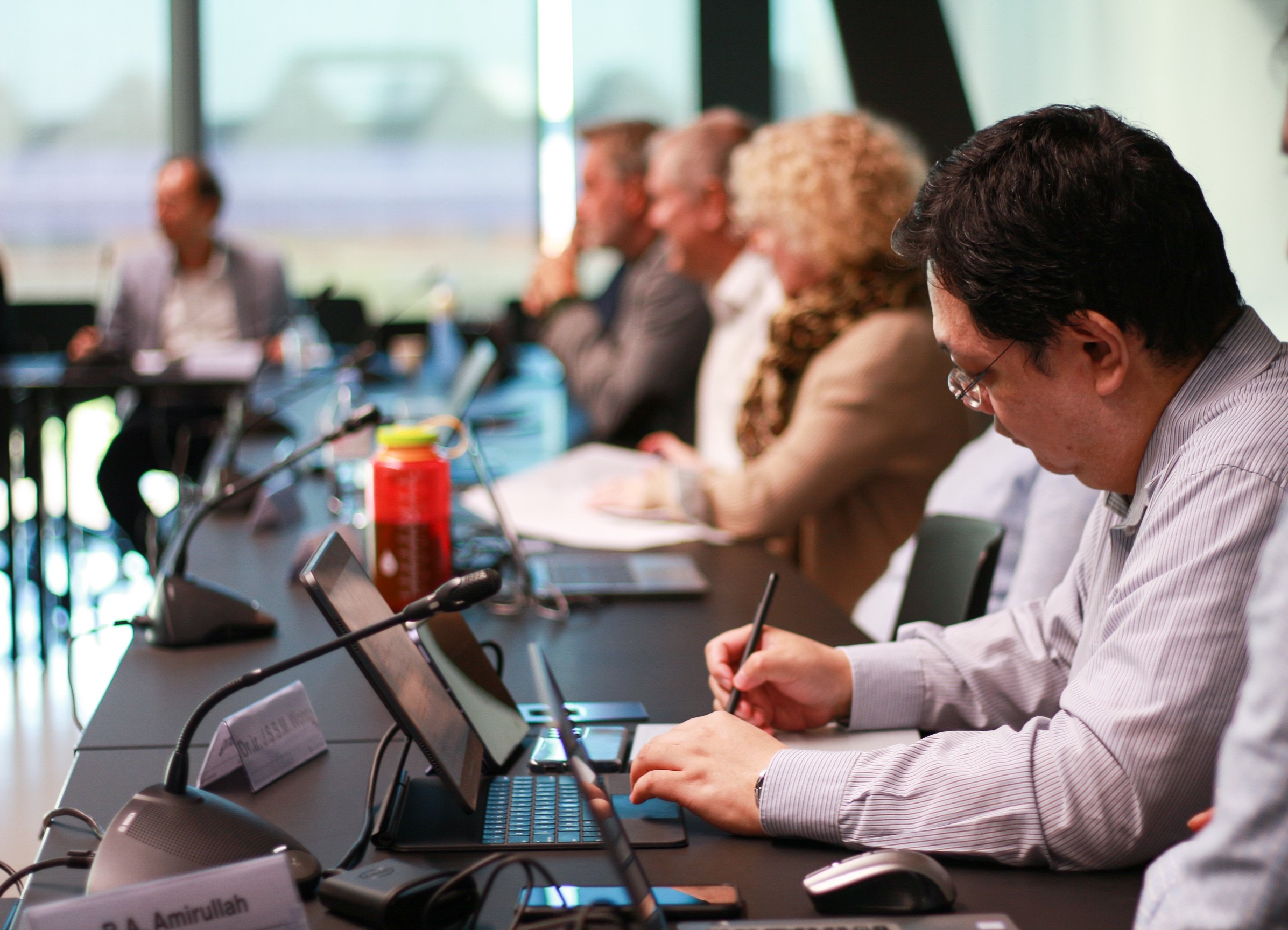For the first time since the Inspectorate of Education’s report was published, the Executive Board, Works Council (OR) and Student Council sat around the meeting table together. Only a small part of the meeting was public. A couple of new pieces of information were shared. One of these is that the OR wants more women in some management teams.
A works council meeting with the Executive Board in October 2021. (Photo: Justyna Botor)
At the start of the public section, OR Chair Ronald Kuil briefly summarised what had been discussed up to that point. The Executive Board had explained what it had gone through over the last few weeks. The difference in the tone between the Executive Board’s response now and its first response was also noted. Kuil says that it is ‘much more empathetic’ now.
More women
What the plan of action entails that the Executive Board hopes will lead to an action plan for social safety was also discussed. It transpired that the Works Council had put a number of requests on the table. It does not only want the plan of action to address social safety, but also the organisational culture, diversity and inclusion. There should also be more women in management teams in some areas.
It was also stressed that every staff member should have the opportunity to contact Berenschot, an external consultancy firm, whereby confidentiality is guaranteed. Apart from the OR, the Student Council will also have the right of consent on the plan of action. Both Councils will receive a budget to hire an external advisor.
Different types of public meetings
The OR is involved in different kinds of open meetings where anyone interested is – in principle – welcome.
- The internal meeting where OR members meet to prepare for consultation meetings such as with the Executive Board.
- The consultation meeting with the Executive Board.
- Joint meetings with the Student Council and the Executive Board.
- A preparatory meeting (the so-called pre-gv) for the joint meeting where only the OR and the Student Council are present.
The agendas and a limited number of documents for these consultation meetings are available on the shared drive: U:\ODCOR\Ondernemingsraad info.
The Student Council gathers for internal meetings and meetings with the Executive Board every month. Both meetings are open. Dé Partij keeps an agenda of these online (in Dutch).
Extension
After Kuil’s summary, the Student Council could repeat their questions to Vice-Rector Rob Mudde. This part of the meeting was partly an extension of the consultation meeting between the Student Council and the Executive Board held the previous week that Mudde was unable to attend as he was ill.
‘There was a hitch along the way and we did not take proper action’
Student Council member Sam de Jong again criticised the communications to students around the Inspectorate report. “Why had they not been informed about the publication of the report earlier, and why was almost all the communications in Dutch?”
Mudde explained that ‘in line with procedures’ the students were to be informed at the same time as staff members. “But there was a hitch along the way and we did not take proper action.” He guaranteed that from now on students would be actively involved and that all communications would be in both Dutch and English. As is the case with the report that is now being translated.
Mudde announced that sessions will be organised for ‘many groups’ , including and especially for students. To make this widely known as quickly as possible, he asked for the help of the Student Council, the faculty study associations, the Verenigingenraad (the governing body for student associations), and the Studieverenigingenraad (the governing body for academic societies).
Not needed
Jelle van der Stap, Chair of the Student Council, repeated what a pity it is that the first one-and-a-half hours of the meeting was not open for the ‘entire TU Delft community’ and argued for as many meetings as possible to be made publicly accessible ‘in connection with the need to work on this together’. “So that we do not leave anyone behind.”
Stap says that he still does not understand why this was not the case now. He got no real clarification though. Rector Magnificus and Executive Board Chair Tim van der Hagen explained that the decision was taken so that “people did not feel hesitant to speak out”. With hindsight, he said, that closing off part of the meeting would not really have been necessary.
- Delta is still looking for current and former TU Delft staff members who are willing to share their experiences. This can be done anonymously if preferred. Email tudelta@protonmail.com.
Findings
The Inspectorate of Education investigated transgressive behaviour at TU Delft from December 2022 to November 2023. In the resulting report, the investigators speak of intimidation, racism, sexism, bullying, exclusion, gossiping, social insecurity due to lack of leadership and a culture of fear, among other things. For instance, employees are said to be afraid to voice their opinions and hold each other accountable for behaviour.
The effects among TU Delft employees who have reported to the inspection are often long-lasting and hampering. The inspectorate speaks of psychological and physical health complaints, absence from work and a general feeling of insecurity. Stress, burnout, depression and PTSD, crying and tense home situations also occur, as do illness, vomiting at work, panic attacks and heart palpitations.
The inspectorate reports that TU Delft’s university administration has a lot of information regarding what is happening in terms of social safety, but that they ‘omit to add everything up so as to create a complete picture’. ‘The management’ also ‘does not adequately manage in terms of appropriate measures’. The Inspectorate believes that this is mismanagement.
Read the news and background articles on the Inspectorate’s report in our dossier.
Do you have a question or comment about this article?
m.vanderveldt@tudelft.nl


Comments are closed.